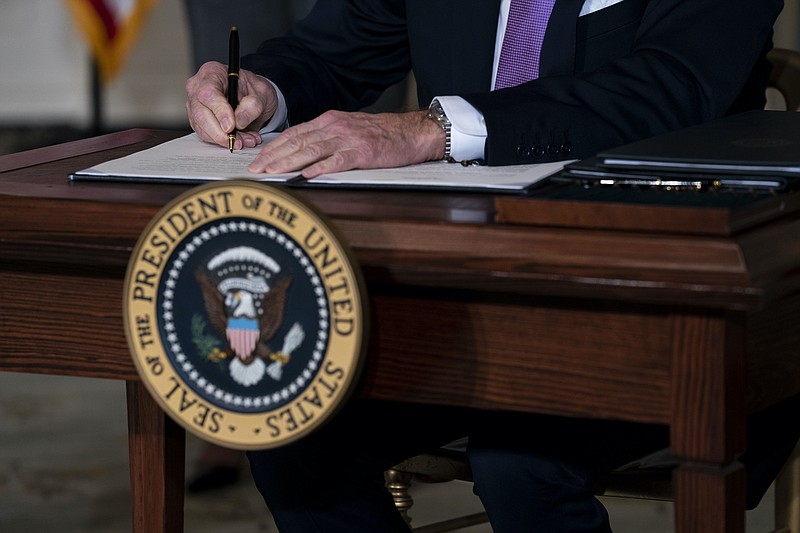Biden steadily hits reset
While the GOP fringers whisper QAnon baloney to one another and House Minority Leader Kevin McCarthy kisses the ring of a disgraced former president now twice impeached, Joe Biden stayed steady last week in the Oval Office resetting American norms.
In his first week, Biden put us back in the Paris climate pact, revoked the permit for the unneeded Keystone XL pipeline, restored several national monuments whose footprints were reduced by his predecessor, halted the construction of "the wall" along our Southern border (saving at least an estimated $2.5 billion) and scrapped a batch of previous administration executive actions that restricted how federal agencies make regulatory changes, including one nonsensical one requiring agencies to discard two regulations for every one proposed.
Biden unveiled a plan for immigration reform, reaffirmed the Deferred Action for Childhood Arrivals known as DACA, ordered undocumented immigrants to be counted in the census, ordered his government to conduct equity assessments of its agencies, reversed his predecessor's transgender military ban, signed an order banning discrimination on the basis of gender identity or sexual orientation and reversed a policy barring entry to the U.S. for refugees and residents from seven predominantly Muslim countries.
As for the swamp, Biden nixed Trump's midnight bid to reverse ethics commitments for executive branch employees. The new president, instead, upped ethics controls, signing an order requiring all government appointees to sign an ethics pledge prohibiting the acceptance of gifts from registered lobbyists and lobbying for at least two years even after exiting the government.
And all that was just the in-between stuff - tucked in amid the COVID-19 actions and orders all designed to up our vaccines and treatments ante.
But day nine's work may have been the next single most important action (after the COVID-19 work) in the short run. That's when Biden signed an executive order reinforcing Medicaid and the Affordable Care Act.
Not only does this order designate Feb. 15 to May 15 as a new "special enrollment period" for uninsured Americans to sign up on healthcare.gov for health insurance amid the pandemic, it also aims to make that sign up easier and more protective.
Biden's order directs agencies to reexamine policies from the previous years that undermined protection for people with pre-exisiting conditions, complicated the process of enrolling in Medicaid and the ACA, and reduced coverage and affordability of the problems.
Now that's how to get some real work done.
Working to lower the temp
The president also added some gravy to his order rejoining the Paris climate agreement.
In calling for the nation to determine its target for emissions reduction, Biden directed federal agencies to incorporate climate considerations into their international plans, as well.
Plus, agencies are now directed to purchase American-made, zero-emission vehicles - an effort to create union jobs as part of Biden's "Buy American" agenda. Another goodie is his suspension of new and future oil and natural gas leases on public lands to conserve at least 30% of federal lands and waters by 2030.
There's another order establishing the Office of Domestic Climate Policy and a national climate task force and working group to assist communities impacted by coal mining and power plants and an environmental justice council to "address the disproportionate health, environmental, economic and climate impacts on disadvantaged communities."
Already, these orders are prompting needed change.
General Motors announced it would transition entirely to zero-emissions vehicles by 2035, setting a new bar for fuel efficiency goals in the auto industry.
The GM news signaled that Biden and other leaders may encounter diminished resistance from big business as they try to shift away from fossil fuels in a last-ditch effort to fight the most perilous effects of climate change. Last year essentially tied with 2016 as the hottest year ever recorded, and scientists say the planet is speeding toward irreversible damage.
Biden was clear as he detailed his plans last week: "It's not time for small measures," he said.
Change is hard; make it easier
Expect some bumps in the road. Junior will have to learn to like the slightly different roar from the hybrid electric NASCAR engine, and there will be some other pain, too.
Our nation for now remains heavily reliant on oil and gas, and the president and his deputies are aware they must take steps to blunt the short-term economic fallout.
Federal fossil fuel leasing accounts for nearly a quarter of U.S. greenhouse gas emissions. But it also generated nearly $8.1 billion in tax revenue in fiscal 2020, according to the Interior Department's Office of Natural Resources Revenue. That is revenue shared among federal, state, local and tribal governments. And, yes, there are related jobs.
To help communities grapple with the shift, Biden has formed a White House interagency working group headed by climate coordinator Gina McCarthy and National Economic Council Director Brian Deese.
"We're going to make sure that nobody is left behind," McCarthy told reporters Wednesday. "We need to put people to work in their own communities. That's where their home is. That's where the vision is. So we are creatively looking at those opportunities for investment so that we can get people understanding that we are not trying to take away jobs."
Stay tuned.
